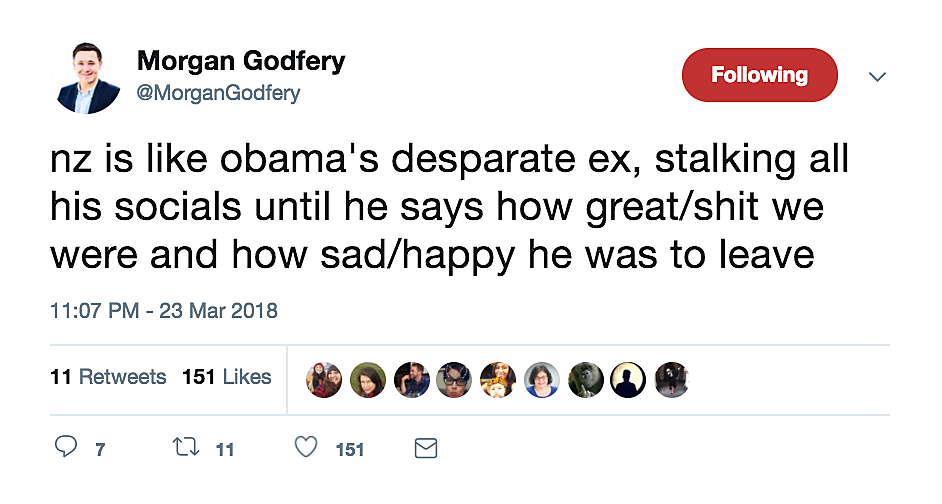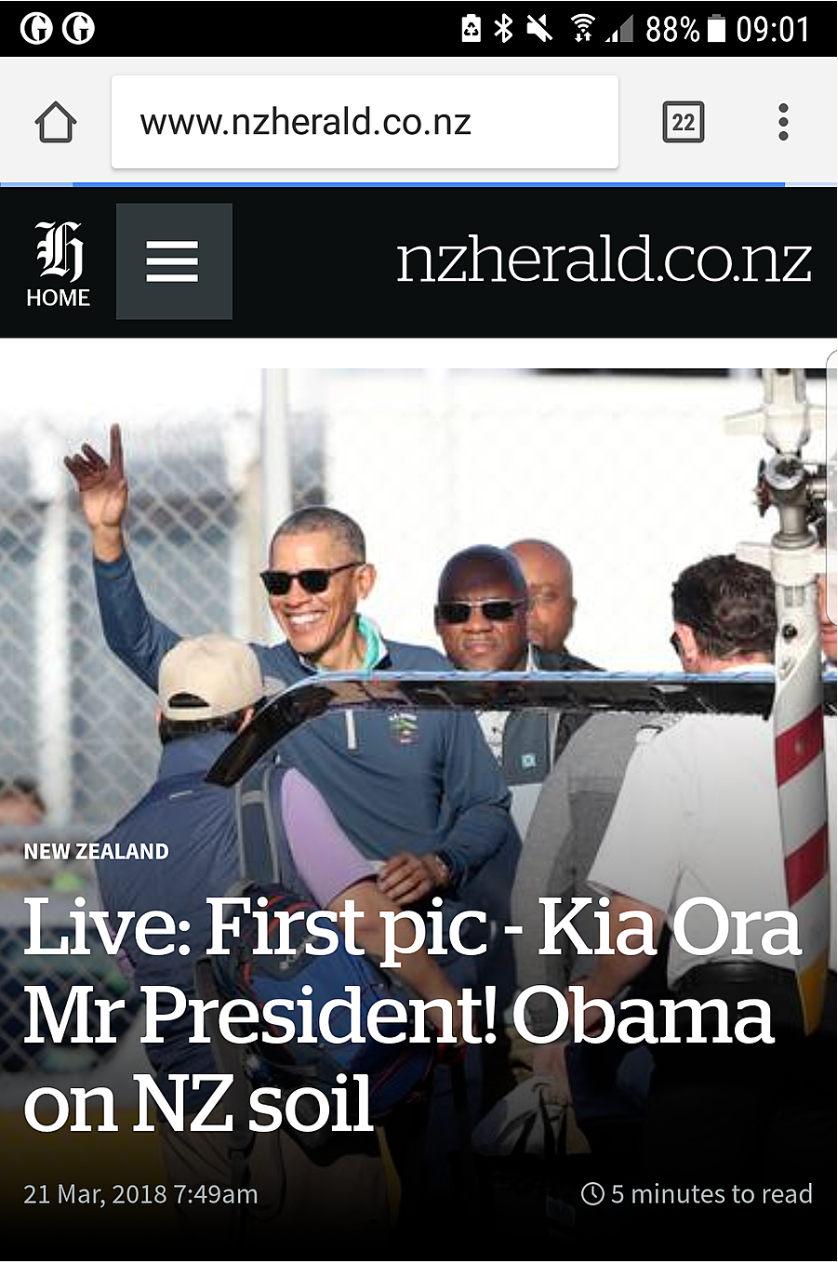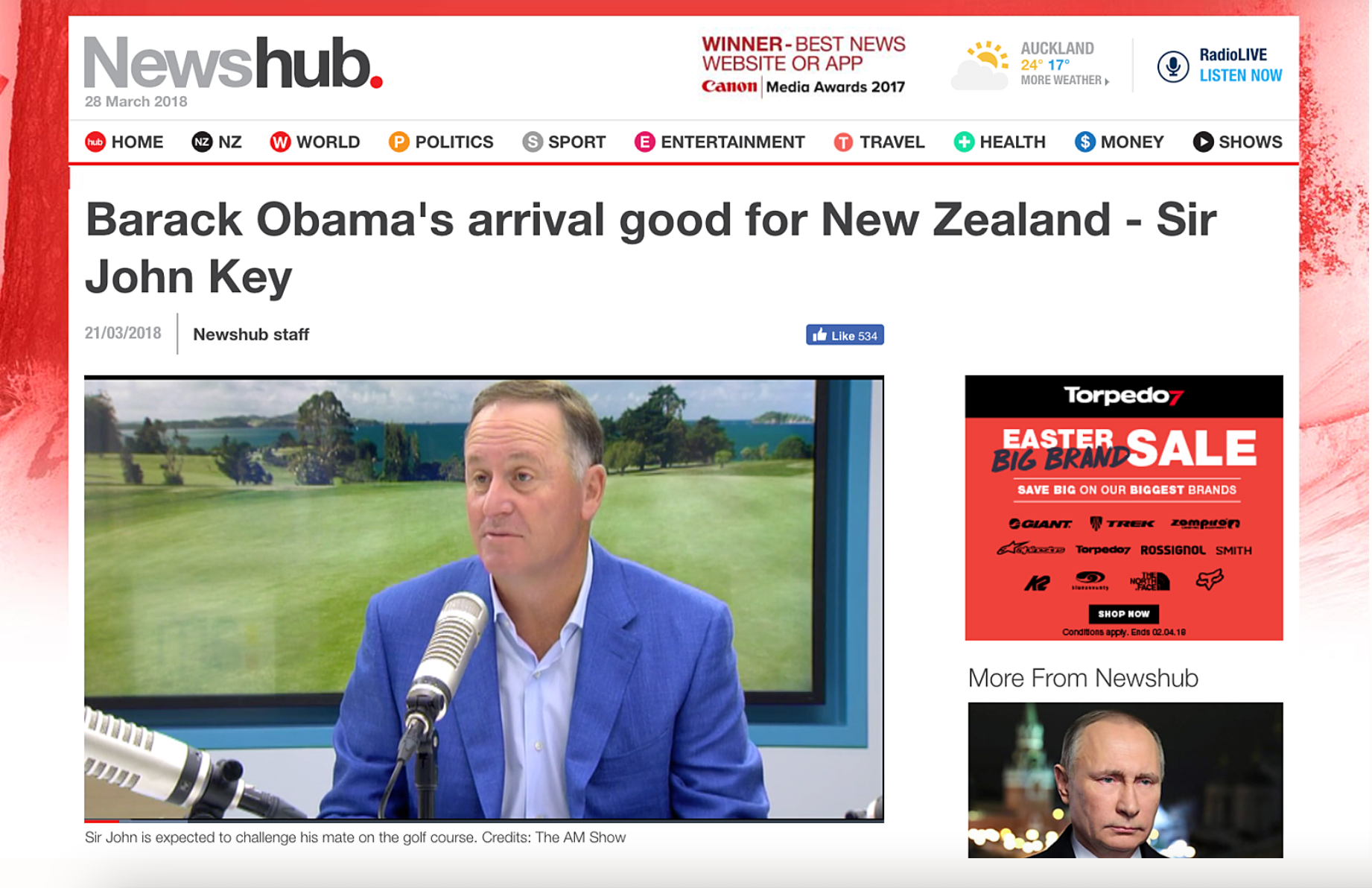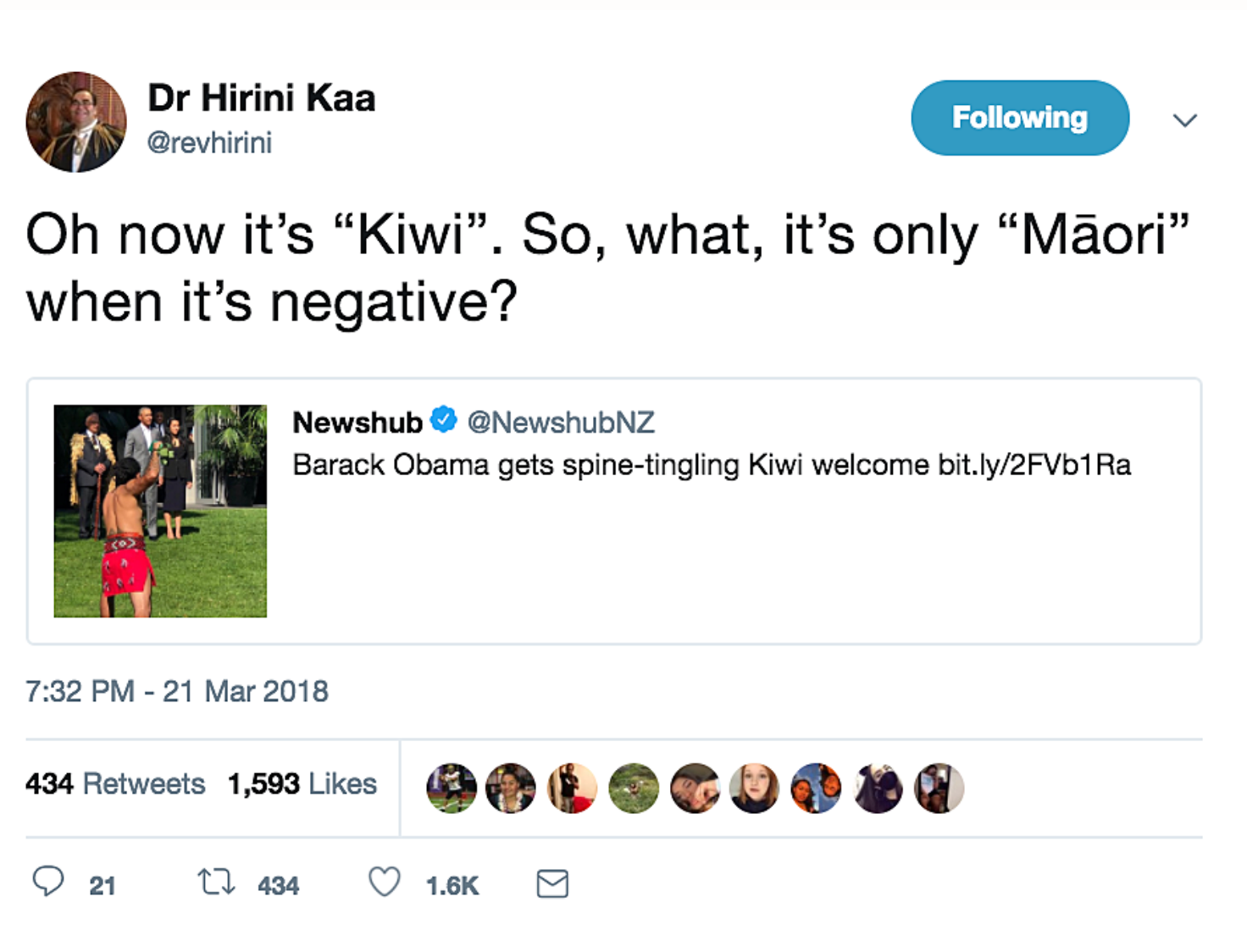The Political Celebrity and the Politics of Celebrity in Aotearoa
Brand Key is infiltrating your media coverage, and you may not even realise it’s happening.
Brand Key is infiltrating your media coverage, and you may not even realise it’s happening.
Wednesday March 21st, the day that Barack Obama arrived in Aotearoa New Zealand, was seemingly a big deal. That morning I was scrolling through the different online news sources to create a round-up of New Zealand’s news, as I do every morning for 95bFM in my role as the News and Editorial Director. Fifty-six people were killed that morning in Syria, the CEO of Cambridge Analytica was suspended, it was the Iranian New Year, and the last male northern white rhino died. And yet, our major news sources had live updates of Obama’s first movements as he arrived in the country. It was even announced as a headline when the reporters got the “first pic.”
The NZ Herald, Stuff, One News and Newshub all had Obama’s visit as their top story, indicating the importance of the visit from “our” prestigious guest. I put “our” in quotation marks because New Zealand paid for the visit,[1] the speaking cost alone is understood to be $400,000 US dollars, and it was sold to us that Obama was here to visit us, New Zealanders, despite it being a private trip. It was also sold to us that this would be a good thing for our economy, for our tourism industry, and just plain good in general because Barack Obama is after all “the best President the United States ever had.”
There is much to be applauded regarding the incredibly important and historic position Obama had as the first African American President, as well as much to say about the problematic institution itself that he was at the helm of for eight years.[2] However, this piece hones in on Obama’s relationship with former Prime Minister John Key and the goldmine this becomes for mainstream New Zealand news.
Jack Tame was describing Obama’s movement towards a helicopter after landing. Stuff’s updates were of similar sightings from a distance. Mike Hosking spent the minutes allocated to him in his own bubble of a segment, Mike’s Minute, talking about how bad it is for New Zealand to have a foreign buyer’s ban because Americans such as Julian Robertson, who bought the land for the golf course Kauri Cliffs, won’t be able to buy more land and set up more incredibly expensive golf courses. This discussion made me feel disgusted, because of how very unnecessary the diatribe that escaped his mouth really was, and how completely irrelevant it was to anybody unable to access such an elitist golf course (not to mention the number of houses that could be built on a golf course). Despite this, Hosking’s rant is in fact a useful vantage point for outlining the main issues this trip raises. Firstly, that this trip is simply an exercise in reaffirming the importance of luxurious lifestyles afforded to certain people by way of neoliberalism. Secondly, the conflict that arises when neoliberalism relies on an exploitation and privatisation of land that then distinctly affects Māori. Neoliberalism being an economic agenda that creates markets in all aspects of life, making money the priority, and seeing the deregulation of those areas and thus the decrease of governmental influence. This is ultimately seen in the reduction of the political to a celebrity playing golf.
Duncan Garner’s The AM Show was where I stopped – a familiar face had popped up. The Key family had been alluded to in some reports because Obama’s first plans were understood to be a game of golf with his old mate. The guest on The AM Show that morning, New Zealand’s former Prime Minister John Key himself, revealed that he had approached Obama. The headline read, “Barack Obama’s arrival good for New Zealand – Sir John Key.” An opinion of New Zealand’s former Prime Minister presented and framed as fact. This sort of statement about the Obama visit and others like it, promoting Key’s opinions as truth, is something we became very familiar with during Key’s prime ministerial term.
This characterising of Key as the “kiwi bloke” is what I call Brand Key, and the Obama trip is no more than a successful exercise of the brand
Fairly well known as being “New Zealand’s most casual Prime Minister,” he was known for being the guy you’d find at a BBQ discussing the All Blacks, more than happy to make fun of himself and of others, bringing himself to the level of “the people” – he typified the “kiwi bloke.” This characterising of Key as the “kiwi bloke” is what I, and others, call Brand Key,[3] and the Obama trip is no more than a successful exercise of the brand. In exploiting the “kiwi bloke” framework, Brand Key centres New Zealand identity on the white male, a colonial identity that defines what is considered as a normal way of acting, and furthermore, downplaying any kind of serious issue, because as is said in New Zealand, “She’ll be right, mate.”
The byline on the Newshub article beneath the video said, “Sir John is expected to challenge his mate on the golf course.” Within the first minute of the interview Garner was quizzing Key on who was better at golf and who was going to win. The relationship between former Prime Minister of New Zealand and former President of the United States was the news – their banter and their mate-ship. Regardless of the prestige, the power, and the sway each of these figures has in their own right, and in their own jurisdictions, Key played down any implications of such privilege by saying “there’s no politics” during their golf game. Mark Richardson, famous for being upset with himself that he had mispronounced a Māori word and also saying being a mother isn’t a full time job, asked Key whether he thought New Zealand could create an environment where Obama could just “chill out.” As Key says, “The big advantage of not having to run the country is I can go out and play golf when I want.” I mean, is this country seriously trying to be a retirement village for the rich and famous? Is that all we aspire to be?
Sport is often referred to as being apolitical. Even without historical cases such as the Springbok Tour for evidence, the political figures themselves and their legacies (whether bad or good) left behind should not be disregarded for the sake of displaying the chummy relationship between the two leaders. At this point, Key also reinforced that “we might be on NZ soil, but he’s the captain,” and this statement in itself is concerning regarding New Zealand’s capability and independence as a nation in standing up to powers such as America.
Furthermore, Key discussed the benefits of Obama’s presence for the tourism industry, saying, “If there is a picture of him on a great New Zealand golf course, that’s gotta be good for New Zealand.” Why?
Furthermore, Key discussed the benefits of Obama’s presence for the tourism industry, saying, “If there is a picture of him on a great New Zealand golf course, that’s gotta be good for New Zealand.” Why? So we can build up that industry of elite guests who use unattainable services in a country that was rated as having the worst homelessness in the OECD only last year? Key took the chance to acknowledge and praise America’s economic situation under Obama, and Garner used the opportunity to compare it to New Zealand, saying you could say the same here in regards to Labour reaping the rewards of National’s economic stability. The same economic stability that saw homelessness increase, child poverty worsen, and environmental effects become increasingly irreversible.
What Brand Key represents is neoliberalism as “common sense” and as essential to being a New Zealander. The way that this personality is able to operate so smoothly in the public sphere is the adherence of news media to the same priorities, those of commercial interests, and the celebritisation of content. Here, Key is the celebrity and celebrity becomes the obsession. Celebrity becomes information. What celebrity says becomes truth. And how celebrity operates becomes the measure of success, as well as the standard norm. Anything that acts differently to that is not given the same standing.
Key played an incredibly important role in this process; positioning himself in an illusionary depoliticised manner is in itself a highly political act. This is because Key was represented as an ordinary person, yet, his role as Prime Minister elevated him to a position of celebrated, and hence “celebrity” power. The situation is further complicated by the fact that Key was not really just your average bloke, he was an ex-currency trader turned politician. He is well versed in the language of economics, specifically neoliberalism, and it is this that enabled him to run the country because he was able to do it in a way that aligned with a market-driven ideology.
Key downplays the implications of his actions because he chooses to represent himself as a regular guy who makes mistakes
In a time when neoliberalism has been hailed and enforced as best for our economies, similar effects of privatisation, deregulation and the prioritising of commercial interests are seen in the media as well. Key, and Obama, both get airtime because they are celebrities. During their time in office, both political figures had access to huge amounts of power. What is significant here is the way they are able to conjure up reactions from ‘ordinary New Zealanders’ even after their tenure is over. Key attempts to depoliticise his every move, while disregarding the fact that he himself is political. Deciding not to go to Waitangi and attending a sports event instead, is political. Touching a woman’s ponytail without consent, is political. Making jokes about cannibalism, is political. Calling a t-shirt ‘gay,’ is political. Key downplays the implications of his actions because he chooses to represent himself as a regular guy who makes mistakes.
I continued to be inundated with news of Obama’s whereabouts over the next couple of days. What mostly struck me was the fact that his official pōwhiri or “Kiwi welcome,” as one media outlet called it (what the hell even is a Kiwi welcome?), did not occur until AFTER two rounds of golf had been played and he’d already spent a night in the country. Being born into a family committed to tikanga Māori and with te reo Māori as my first language, my still-limited understanding of those protocols had me questioning this because the pōwhiri is supposed to happen first. In fact, you can’t really do anything else until the pōwhiri is over. This was Obama’s first visit to Aotearoa, and as such the mana afforded to him, as it was in the pōwhiri, should have been afforded sooner. Those organising the trip should know better, given they are bringing him to Aotearoa. But no, the plan was for a second round of golf, where Obama could avenge his loss to Key the previous day. This in itself was cause for a news story, and a discussion here.
It’s disturbing when the media use Māori words in a token way, or to make themselves feel included. They spend so much of their time ensuring Māori are presented as outside of the norm that the incorrect use of words such as utu are immediately visible. Utu is a concept that cannot be removed from the wider implications of one’s mana being affected, and the subsequent obligation of restoring order or balance to everyone affected. Throwing it in casually in regards to a game of golf ignores the depth of that concept.
The use of the word ‘Kiwi’ is a political act of inclusion and exclusion, which has come to define the ‘ordinary New Zealander.’
The use of the word ‘Kiwi’ is a political act of inclusion and exclusion, which has come to define the ‘ordinary New Zealander.’ The way it is used, and who uses it, indicates who is included and who is not. Brand Key uses this to deem certain behaviour inappropriate, that which sits outside of his own presentation as a Kiwi bloke. We have come to learn that under Brand Key, ‘Ordinary New Zealanders’ do not include Māori. The way that Key referenced ordinary New Zealanders was a Machiavellian way of addressing ‘the nation’ but quite specifically excluding a large number of people. Key can relate to ‘ordinary New Zealanders’ because he was one, so, consequently, those who do not align with Key’s definition of ‘ordinariness’ are excluded from being New Zealanders. Most specifically excluded from this are Māori because they’re not like Key, not Pākehā. This lack of recognition around their position as tangata whenua and what that means, causes conflict.
Key has the ability to get away with anything. While it is a big claim to make, there are a number of examples that provide testament to that claim. But perhaps it suffices to say that “Brand Key” was able to get away with anything. His public relations team would have had plenty to do with it, also, but his ability to be “one of the guys” meant that any mistake he made was just a mistake because he was human, he was normal, and most of New Zealand could comprehend that type of behaviour. The fact he was knighted also tells us that nothing bad he did mattered remotely anyway; he was still awarded for his ‘services to the state.’ His nickname, “Teflon John,” was no joke. It accurately represented the way in which Key conducted himself, as though nothing would ever stick. And it was his ability to position himself in his own person and say, about whatever he had done wrong, that he had not meant it to be that way. This in turn puts the blame on whoever is upset because it was they that took it the wrong way, and perhaps they should be a bit more “ordinary” about the situation.
Key’s agenda was to run this country as a financial corporation, and to him, even now that he is out of office, Obama as a celebrity playing golf here is a good publicity stunt. Therefore, this trip was marketed as good for New Zealand. Someone who operates first and foremost in the name of finance, then, defines what is good for New Zealand, and finance becomes the definition of progress, even if the majority of people in this country won’t directly benefit from such a visit. As someone who consciously objects to being called a Kiwi (because it lacks any kind of historical or political engagement with the colonial context of the land we live on, bar its token assimilation of the Māori word) I found this latest episode of Brand Key disturbing. What is more concerning, though, than someone whom I am happy to never talk about again and who may very well go and retire in Hawaii – where Captain Cook was killed I might add – is the mainstream media and the way they regurgitate, seemingly unconsciously, this ideology.
The Kiwi Bloke represents, reinforces and perpetuates a colonial mindset that allows for colonial and imperial domination to continue in Aotearoa. Furthermore, the Kiwi Bloke, in his “depoliticised” nature, has tendencies to exhibit racism, sexism and homophobia
The Kiwi Bloke represents, reinforces and perpetuates a colonial mindset that allows for colonial and imperial domination to continue in Aotearoa. Furthermore, the Kiwi Bloke, in his “depoliticised” nature, has tendencies to exhibit racism, sexism and homophobia. John Key was representative of the mindset of New Zealand society and embodied the Kiwi Bloke. What is significant in regard to Key was the performance of that mindset in a time of neoliberalism, where news media adheres to such principles of promotional and consumer culture allowing for a mindless reproduction of that attitude, and further entrenching the colonial Kiwi Bloke. In reproducing that attitude, with little room for resistance and little room for any alternative way of being, the racist status quo is maintained and reinforced by the government, and by their mouthpiece, the media.
[1] Air New Zealand (of which the government has a major share), the New Zealand US Business Council, Westpac and Mastercard have sponsored the trip.
[2] The United States of America is a colonial and imperial state that exists on lands confiscated from First Nations people of Great Turtle Island. The state was built on the backs of slaves. Its legacy of Freedom, Liberty, Equality and Justice has led to interventionist wars that have wrought inhumane and absolute destruction in the Middle East.
[3] Lillian Hanly. Brand Key: Personality Politics, the Kiwi Bloke and the Persistance of Colonial Identity. Masters Thesis. University of Auckland. 2018.






